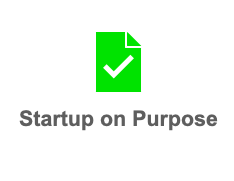Startup Consciously Brainstorm Beyond Business
Startup Consciously: Startup consciously and brainstorm beyond business.  Founders face knotty decisions personally, as well on the project itself. There are many misconceptions about entrepreneurship. Unraveling your own personal ‘truth’ about why you want to create a new enterprise will be vital to its success.
Founders face knotty decisions personally, as well on the project itself. There are many misconceptions about entrepreneurship. Unraveling your own personal ‘truth’ about why you want to create a new enterprise will be vital to its success.
Advice about how to plan a startup abounds—my opinions included. There is no perfect way to become a business founder. Your heart is as important as your head. This is why so many people with excellent ideas for startups never actually take the step.
Of course, your will hear the non-starters tell you all kinds of reasons that may be true, but not enough to back away. Examples include: “the economy is not good right now”, “the market/technology has changed”, “we need to do some more research before we launch”, but chances are high that it’s their hearts that are stopping them. Make sure you startup consciously—being clear about your personal motivation for making the leap.
Here are just a dozen startup axioms that ‘experts’ claim:
- goal is to get rich;
- outside equity/debt is involved;
- only one idea is needed;
- product has to be perfect;
- no risks—avert failure;
- need to be young;
- business plan is essential;
- timing is everything;
- ignore critics;
- protect the concept;
- avoid competition;
- scaling is vital.
Question These Statements and Your Own Motivation Beyond the Business
Consider startup consciously and ask yourself why, why, why about each one of the 12 statements. Preferably brainstorm them with co-founders, if you have them, or with trusted friends/advisers. Much more important is to question your own motivation to launch a business.
In my case, I had tried as a solopreneur and it had not worked. I tried starting a subsidiary of my big firm employer with a structure of phantom shares to make it feel like I was a part-owner, and that did not work because we did not grow big enough, nor make the targeted profits. Both of these earlier efforts were based on wanting deeply to do a startup, which I finally did at the age of 43.
I never could explain to myself, why I was so motivated to start a business. On later reflection, I think there were three compelling reasons. First, it was based on feeling that I could do a better job of running an enterprise than I had experienced working for others. Second, was that the business idea was a way of making the world a better place, even if only in a small way—by managing the startup participatively and by offering a service that improved clients’ people performance. More selfishly, the last reason was a need for personal autonomy.
Startup Consciously: Is It Self-interest or Altruism?
Your motivations will surely be different. Examine those that are self-interested as well as those that are altruistic. Test them rigorously. Ask friends! Since two thirds of Americans dream of a startup, you probably know one or more of them. When you get ready to build your business, startup consciously.
Some self-interested motivations might be:
- Risking the new business but not the family (so much). For example, when I started my first business,
 I was not prepared to take out a second mortgage on the house, I gave no personal guarantees, but was happy to take a business revenue-based loan and a mortgage on the company’s office.
I was not prepared to take out a second mortgage on the house, I gave no personal guarantees, but was happy to take a business revenue-based loan and a mortgage on the company’s office. - Starting a business because you want to be more fulfilled than your employed daily grind could offer.
- Even though your startup may mean longer work hours and a fixation on the enterprise, if it’s what excites you, chances are that you will be a better family person by comparison with before because you are much more self-actualized.
Altruistic motivations might include:
- Working towards you new venture achieving B Corporation status, registering the company as a Benefit Corporation, or becoming an employee-owned business.
- Giving a percentage of profits to a community cause, or paying for employee volunteer time.
- Founding the business around a product or service that will make a contribution to society, either by its very nature (such as solar power or famine relief) or as a consequence of the business policies you espouse (such as reducing the company’s eco-footprint or waste reduction/recycling).
In either case, it is very important for you to be clear about your motivation to start a business.
Startup Consciously: ‘Where There’s a Will, There’s a Way’
If you can understand and describe your Ikagai, the Japanese word meaning ‘reason for being’, the fundamental drive will propel your startup forward (Startup consciously: read more at https://venturefounders.com/entrepreneurial-mindfulness). According to a model developed by University of Connecticut researchers Login S. George, PhD, and Crystal L. Park, PhD, most psychologists who study the topic agree that people believe their lives are meaningful when three aspects are in place:
- They feel that their lives make sense and have continuity.
- They are directed and motivated by meaningful goals.
- They believe their existence matters to others.
If you want to be a founder who aims to contribution to positive change in society, then use two ways to get clear on your purpose and startup consciously:
- Go Inside and be really honest with yourself about why you want to start your business; dig deep and stay personal;
- Go Outside and test you declared purpose by seeking reactions from people you admire; read voraciously.






